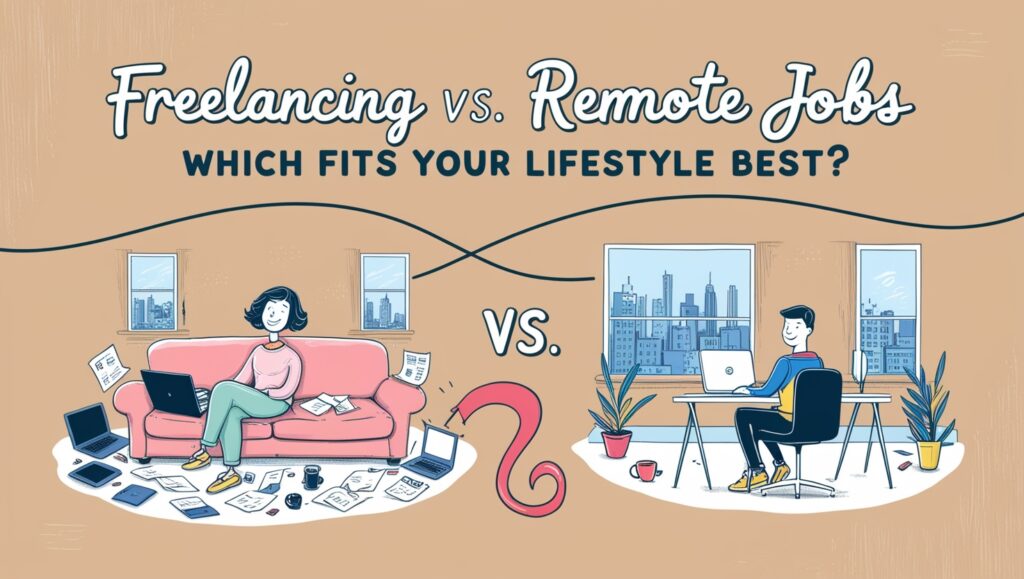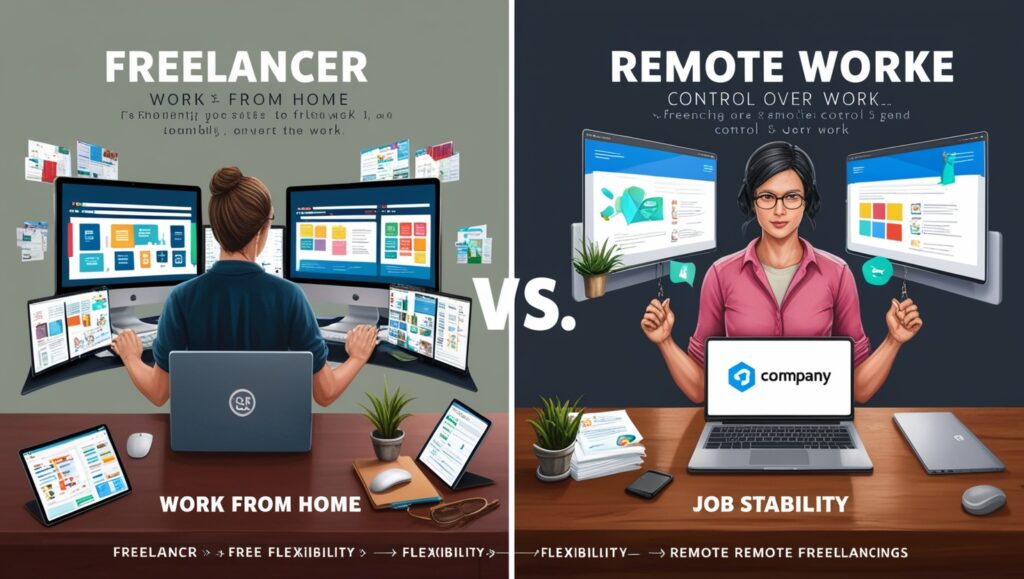Freelancing vs. remote jobs can often be considered interchangeable in the modern era, and the choice between the two can be quite a difficult one for many employees. The two options allow the flexibility of working from home or from anywhere in the world, but they are also not the same in terms of flexibility, job security, and level of control. If you are wondering which of the career paths to take since each has its own set of requirements and personal demands, then this article will be pretty helpful for you. This blog will explore the distinctions between freelancing and remote work so that you know which approach is best for you.

1. What is Freelancing and How Does It Work?
Freelancing is a type of entrepreneurship where individuals provide services to different clients per job. Freelancers are not confined to working a typical 9-to-5 job; they decide when to work, which jobs to accept, and how much to earn. Freelancing is nice. As a freelancer, you can choose your hours and rates, location, and how much you want to work. Check out these part-time work from home jobs for more flexible opportunities to freelance.
Freelancing suits individuals who want to work with minimal supervision, but freelancing demands self-discipline and organizational skills. If you are asking yourself whether freelancing is for you, consider the issues of dealing with several clients at once and the irregularity of payment.
2. What is a Remote Job, and What Are Its Benefits?
A remote job is a regular or non-regular position where employees can perform their duties away from the conventional workplace. In any case, remote jobs provide an opportunity to save time commuting to work and vice versa. One employer pays remote employees a fixed wage, and they are entitled to all the benefits of a typical job.
This could be perfect for anyone who wants the freedom of working from home but also has to work remotely. Telecommuting is excellent, especially for those who love order and stability and appreciate job descriptions.
Explore the top 10 remote job websites for 2024 to find the best remote work opportunities.
3. Freelancing vs. Remote Jobs: Key Differences You Need to Know
Freelancing and remote jobs allow you to work from anywhere, but they are fundamentally different in a way that can shape your career and your life.
- Autonomy and Control: Freelancers are not tied to a schedule, location, client, or project and can pick and choose all of the above. Remote employees need to stay connected to the organizational structure and time, even if they work from home.
- Income Stability: Freelancing vs. remote jobs are similar in some ways, but there’s a significant difference: income. Freelancers have irregular income depending on how many projects they are hired to complete, and remote employees have a fixed wage.
- Workload Variety: Freelancers may work with several clients and various types of projects simultaneously, while a remote worker works on organizational tasks for one company.
By identifying these differences, it will be easier for you to determine which, between freelancing and remote jobs, will work best for you and where you want them to take your career.

4. Pros and Cons of Freelancing: Is Freelancing Right for You?
Freelancing is an excellent way for independent contractors to work, but it has advantages and disadvantages. Let’s explore the pros and cons:
Pros:
- Unlimited Flexibility: It allows you to choose when, where, and how intensively you are willing to work.
- Earning Potential: The above benefits do not have the upper limit of income. In this case, the more projects one undertakes, the more one can earn.
- Diverse Work Experience: Freelancing means that you get to work for various clients in diverse fields.
Cons:
- Income Instability: Unpredictable income is a common problem for freelancers because their earnings depend on project availability.
- Lack of Benefits: Clients must offer freelancers health insurance, paid leave, or retirement.
- Self-Management: Freelancers must handle all taxes, contracts, and clients all by themselves.
Learn how to make extra money online through freelancing and other online side gigs.
5. Pros and Cons of Remote Jobs: Why Remote Jobs Could Be the Best Fit
Telework is secure, which is why it is popular among many employees. Here are the pros and cons:
Pros:
- Job Security: Remote workers receive a fixed pay and are also protected by their employer in terms of employment.
- Work-Life Balance: It means you can work from home without worrying about the hustle of traffic.
- Corporate Benefits: Some benefits companies offer for remote jobs are medical coverage, paid vacations, and pensions.
Cons:
- Less Flexibility: Remote employees are bound to the organization’s time plan and may have fewer opportunities to avoid specific hours at work.
- Limited Earning Potential: Still, while freelancers may earn more money for their projects, remote workers have a stable monthly wage, which may be low.
If you want a secure job and a package, then a remote job is much better than freelancing.

6. Which One Suits Your Lifestyle? Freelancing or Remote Jobs?
Freelancing vs. remote work are not mutually exclusive options, and you need to choose based on your daily habits and professional and personal aspirations. Ask yourself these questions to figure out which one fits you better:
- Am I more of a risk-taker, or am I more conservative?
- Do I feel confident about the handling of my own business and money?
- Can I work simultaneously for several clients and projects, or do I work best when having a single employer?
Freelance work enables one to have the flexibility of working on several different projects, but the disadvantage is that one cannot be sure of the flow of work. Remote jobs, however, offer stability, a fixed income, and opportunities to receive some compensation, but with limited freedom.
7. How to Transition into Freelancing or a Remote Job
If you’re ready to make the shift, here are a few tips for transitioning smoothly into either freelancing or remote work:
For Freelancers:
- Deliver a set of works that would demonstrate your competencies.
- Connect on social media, especially LinkedIn, or sign up on Upwork to gain clients.
- Time yourself well, and do not let yourself get overwhelmed and overtired.
For Remote Workers:
- Adapt your resume by focusing on skills relevant to remote employment, such as communication, organization, and self-motivation.
- Browse for organizations that allow their employees to work remotely and submit applications for jobs you are most suitable for.
- For this reason, it is advisable to prepare your workplace at home to produce the best results.

8. Freelancing or Remote Jobs—Which is the Better Fit for You?
In summary, freelancing vs. remote jobs are great opportunities to work from home and have a good life. However, it all depends on the individual’s preference and the goals they want to achieve. The advantage of freelancing is that you can work when and how you want, but it also means you must be very disciplined. Remote jobs are more likely to have a stable structure, so if you desire a proper work-life schedule, then remote jobs are perfect for you.
Consider the advantages and disadvantages, evaluate your values, and choose a plan that best fits your career goals and personal requirements.
9. Call to Action (CTA)
Are you prepared for work? So, no matter if you decide between freelancing or remote working, you have a wide range of opportunities! Discover your opportunities, bring a shift, and build the career you have been longing for. Stay tuned for more articles on freelancing, remote jobs, and creating a flexible lifestyle!



